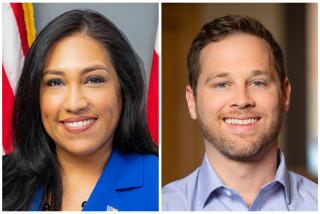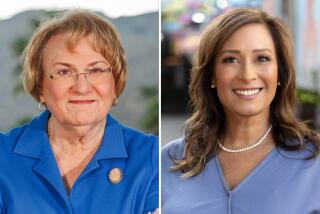Resignation Prompts Early Speculation on a Potential Successor
As the stunning news of state Sen. Alan Robbins’ resignation sped through political circles Tuesday, San Fernando Valley politicians began calculating the odds of capturing his seat in what could be a furiously contested special election in March.
The seat’s sudden availability prompted Los Angeles school board member Roberta Weintraub to declare that she will run and led political insiders to speculate about several other potential contenders, including Assemblymen Terry B. Friedman (D-Los Angeles) and Richard Katz (D-Sylmar).
As part of his plea bargain with federal prosecutors, Robbins (D-Van Nuys) agreed to resign immediately from his 20th Senate District seat, which encompasses a heavily Democratic section of the East Valley. Gov. Pete Wilson must set a date within two weeks for a special election, which would be held no later than March 31.
Other names mentioned as possible candidates included Richard Alarcon, Los Angeles Mayor Tom Bradley’s Valley liaison, and Clifford Berg, a state Senate staffer and former Valley resident closely allied with Senate President Pro Tem David Roberti (D-North Hollywood).
All potential candidates are Democrats in a district with 144,000 registered Democrats and 84,000 Republicans.
First elected to the Senate in 1973, Robbins had the stature of a local political warlord whose high profile and massive campaign war chests scared off all but token candidates. He easily won reelection last year, defeating a Republican candidate by almost 2-to-1.
Styling himself as “the Valley’s senator,” the only one with an all-Valley district, Robbins vigorously advocated local causes ranging from the San Fernando Valley Fair to forcing a planned Metro Rail extension to be built as a subway through residential neighborhoods.
Weintraub, who has served on the school board for more than 12 years, last year changed her voter registration to Democrat, a move many observers viewed as an attempt to position herself for a run for Robbins’ seat.
She said Tuesday that she plans to seek the seat, although she will have to move into the district from her home in nearby Sherman Oaks.
“I think there’s every reason in the world for me to run,” she said. “I feel funny to be talking about it, considering I’ve known Alan for such a long period of time.”
Friedman, a liberal who is chairman of the Assembly Labor Committee, said he was seriously considering a run for the seat and would make up his mind in the next few days.
Katz, Berg and Alarcon could not be reached for comment.
Melissa Warren, a spokesman for the secretary of state’s office, said whoever wins the special election will serve the remainder of Robbins’ term, which ends in 1994. Under new term limits imposed by voters last year, the senator-elect would be eligible for only one additional four-year term.
As potential candidates figured their chances for capturing the seat, one major wild card was the outcome of California’s decennial redrawing of political district boundaries.
Three court-appointed special masters are in the process of reapportioning the state’s congressional and legislative districts, but they are not expected to finish until the end of March. Whoever succeeds Robbins could run for reelection in a substantially different district in 1994.
Political observers said the outcome of the special election could be influenced by how much support candidates received from Roberti, the powerful Senate leader, and Reps. Howard L. Berman (D-Panorama City) and Henry A. Waxman (D-Los Angeles), who head the well-financed Berman-Waxman political organization based in Los Angeles’ Westside.
Although all three are liberal Democrats, Roberti and the Waxman-Berman organization have fielded candidates against each other in the past. Friedman is close to Berman and Waxman, while Berg could be expected to receive financial and other assistance from Roberti.
More to Read
Sign up for Essential California
The most important California stories and recommendations in your inbox every morning.
You may occasionally receive promotional content from the Los Angeles Times.










